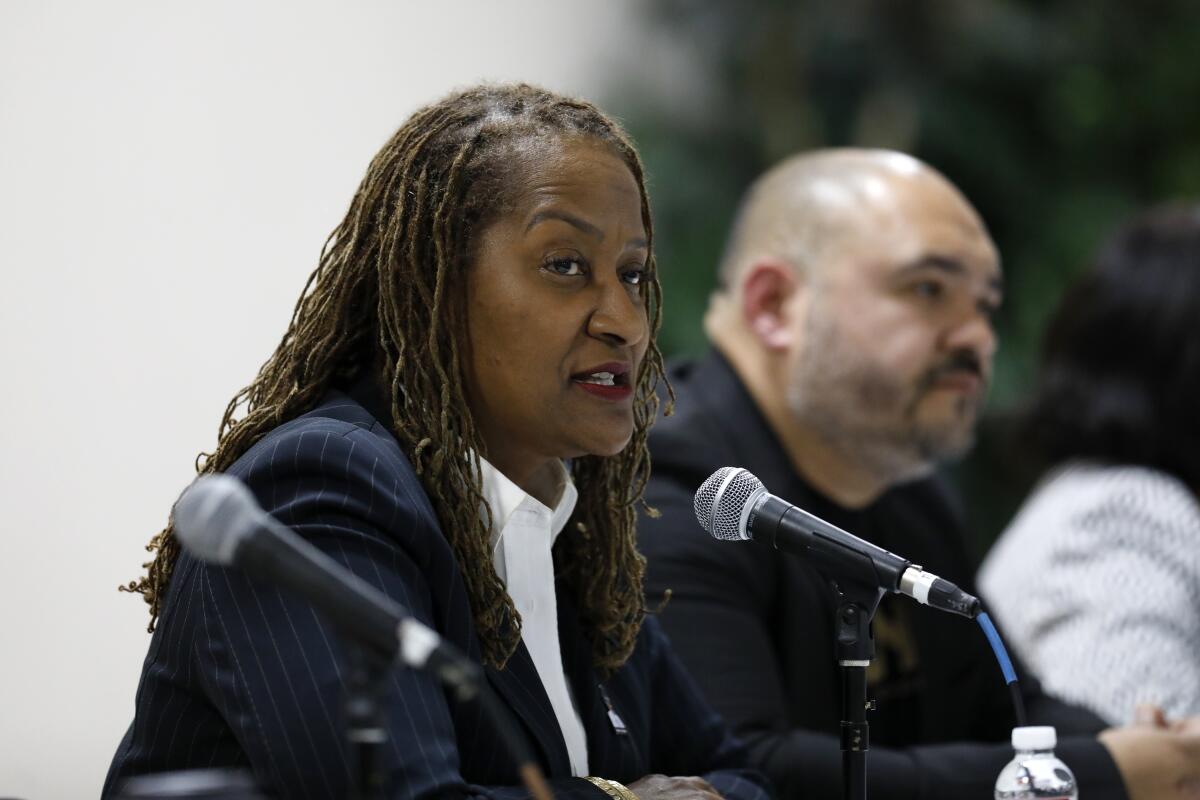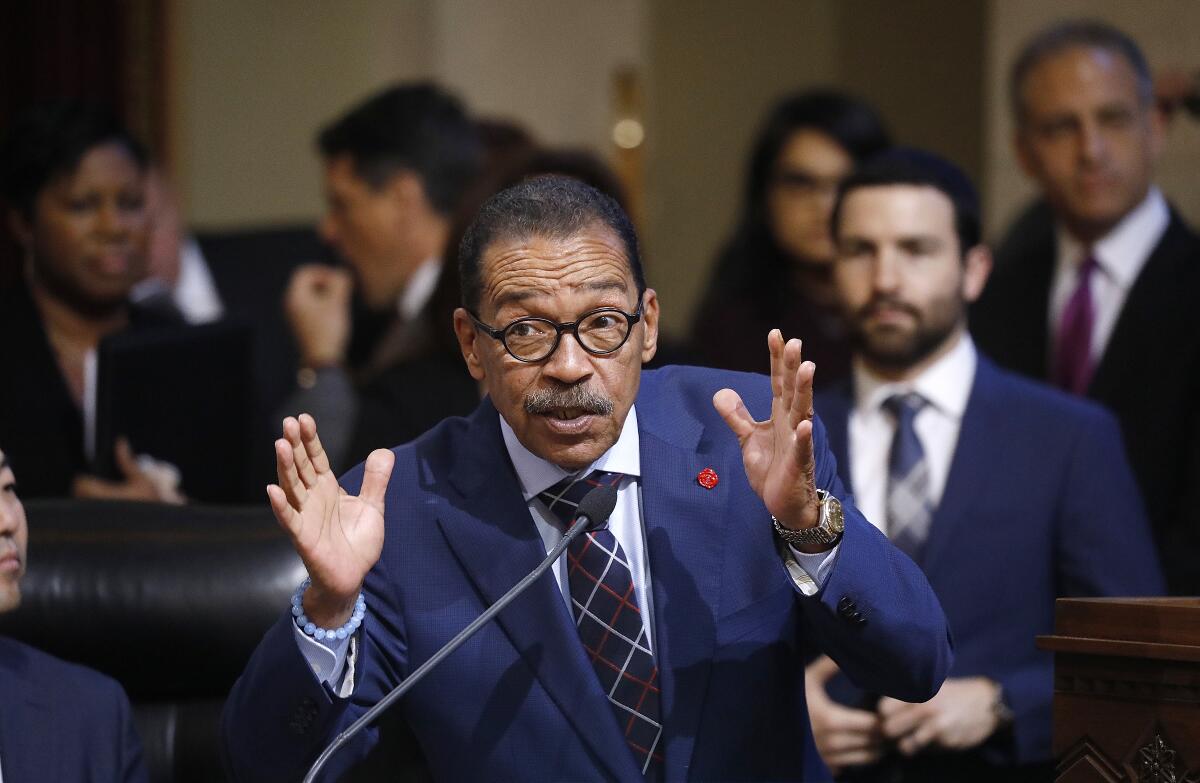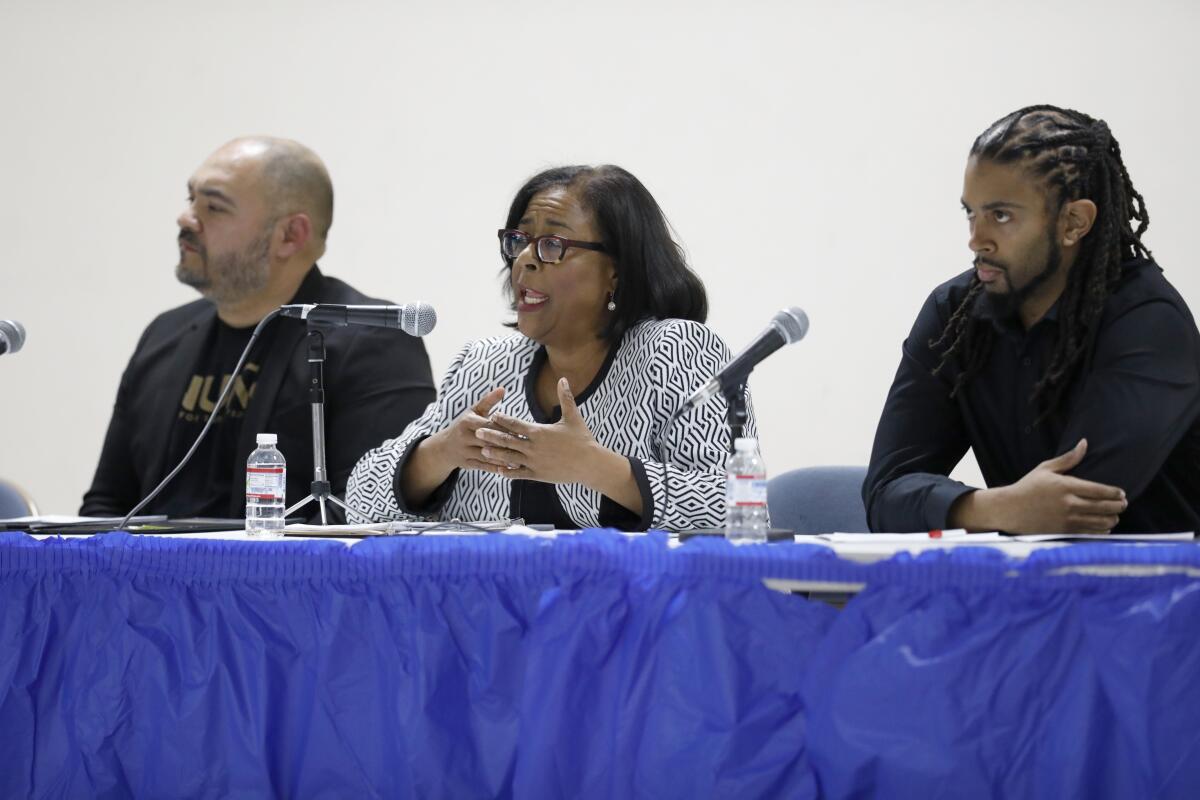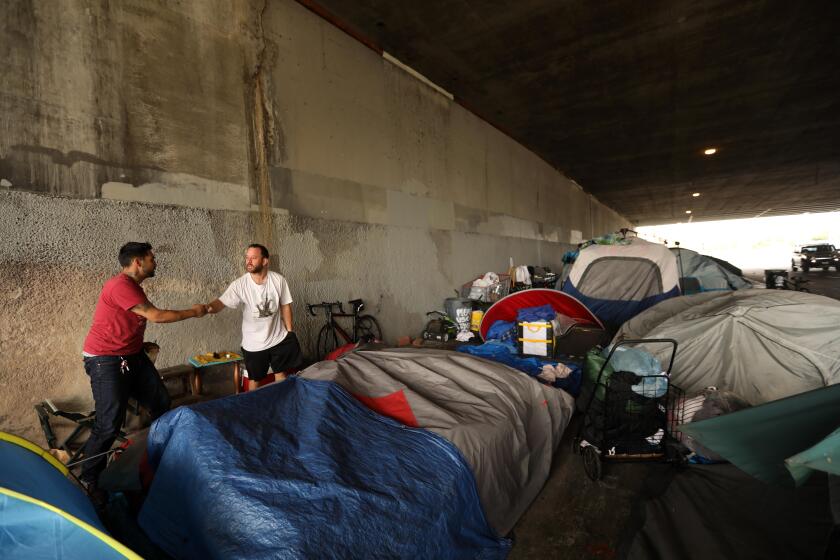In race for L.A. County supervisor, homelessness crisis leads to finger-pointing

- Share via
With some 19,000 homeless residents living in Los Angeles County’s 2nd Supervisorial District, the candidates running to replace Mark Ridley-Thomas on the Board of Supervisors are united in their pledge to ease housing costs and bring people indoors.
At debates, they pitch expanded emergency street services, building prefabricated housing, and policies to stop speculative developers from snatching up homes and driving up housing prices.
But of the seven candidates running in the March 3 primary election, many have served in political office as homelessness has worsened and tents have proliferated in South L.A. and elsewhere in the district. That has prompted attacks in a race rife with questions over whether more could have been done to head off the crisis.
“People who have been in positions of power to do something,” candidate and social entrepreneur Jorge Nuño said at a debate in downtown L.A. last week, “from the City Council to the state, where were they?”
In addition to Nuño, the field includes state Sen. Holly Mitchell, L.A. City Councilman Herb Wesson, former L.A. City Councilwoman Jan Perry, attorney Jake Jeong, businessman René Rigard and Carson Mayor Albert Robles.
Ridley-Thomas is termed out and running for the Los Angeles council seat being vacated by Wesson.
Whoever wins will join the five-member Board of Supervisors, which manage a $36-billion budget and oversee social services for the county’s 10 million residents. In unincorporated areas of the district, the board is the equivalent of residents’ city council and the supervisor their mayor.

As of late February, Wesson had raised the most money in the race, making him a target for rival candidates seeking to burnish their records and policy proposals. This is especially true on homelessness and housing — the top issues in the race to represent 2 million people in a district that includes skid row, Ladera Heights, Inglewood, Lawndale, Gardena, Compton and Lynwood.
Mitchell, in an interview with The Times, took a swipe at Wesson, accusing him of failing to include more affordable housing in the Los Angeles developments he approved on the City Council.
Mailers sent by Perry’s campaign blame Wesson for the tents and the rising cost of homeless housing, as funded under the citywide bond program Proposition HHH.
At debates, moderators quiz the candidates on gentrification, affordable housing and laws targeting homeless people. Audience members do the same. The 2nd District has the largest homeless population in the county, and a significant number of the region’s Latino and black residents.
The district also has a high percentage of adults and families living in vehicles, said John Maceri, chief executive of homeless services provider the People Concern. Jennifer Hark-Dietz, executive director of People Assisting the Homeless, or PATH, said rents have risen so much, that it has become hard for her agency to continue paying rent for tenants on the verge of losing their housing.
Help us inform our reporting about the homelessness crisis in California by submitting your questions.
Mitchell told The Times that there was “room for a more aggressive vision and leadership” from Wesson on affordable housing.
When asked about Mitchell’s comments, Wesson shot back: “What did she do? “I’m not knocking her, but what did she do? We put more resources together to address this issue than anyone.”
Wesson served as council president from 2011 until January. His campaign touts a record that includes helping pass a citywide plan to address homelessness and helping put Proposition HHH before voters. The first housing development funded with the $1.2-billion bond program opened recently at Vermont Avenue and 88th Street after numerous delays. More are expected to open this year.
If elected supervisor, Wesson wants to create an emergency rental assistance program to provide loans to tenants. To curb displacement, he also has proposed capping rents in apartment buildings near new luxury housing and allowing the county to buy apartment buildings where developers are seeking to evict tenants.
At a debate last month, Mitchell targeted a city policy that Wesson helped spearhead, which requires some unused city land to be used for affordable housing. The senator argued the policy would segregate poorer residents and result in smaller tax revenue for local schools.
“Social scientists and urban planners have opined for years that a healthy community is an integrated community,” Mitchell told the audience. She wants all new housing developments built in the county to include at least 20% affordable housing.
Mitchell’s record on homelessness includes legislation she authored to prevent landlords from rejecting tenants solely for using government rent subsidies. She also has pushed to expand housing and resources for foster children, and require law enforcement to be trained to handle people with mental health issues.
During the January debate, she praised the county for its work shifting people from its General Relief financial aid program to federal aid. Recipients get more money and the county is able to save money.
Mitchell also wants to create a community land trust to buy properties and resell them to residents at a more reasonable price. She also wants to offer homeowners tax breaks to build accessory dwelling units and rent them to low-income tenants.
Perry touts her record representing some of the city’s most impoverished areas while she served on the City Council from 2001 to 2013. She helped open a 650-bed homeless shelter in South L.A. and organized monthly walks to skid row to coax people to seek services as a councilmember.

If elected, Perry has proposed creating an “emergency village” equipped with doctors to treat those with mental health issues and physical ailments, and help transition people into housing. Although federal aid hasn’t kept pace with the scope of the problem, Perry said she’d create a Marshall Plan — referring to the aid program for Europe after World War II — to convene federal, state, county and city governments to fund housing, and preventive and supportive homeless services.
Asked about the high percentage of black families who are becoming homeless at a debate last week, Perry said that she’d seek to increase how much people can get from the county’s current General Relief program, which is $221 a month. She told The Times that many people “run out of money before the end of the month and wind up on the street.”
Perry, the chief executive of a nonprofit focused on infrastructure development, also has told voters she will “rewrite” Proposition HHH to encourage developers to build housing faster and cheaper. However, the bond program was approved by city of L.A. voters, not the county, and the money has largely been allocated for projects.
Rigard, who founded an investment company, said he wants to create a “public investment” department to teach underserved communities about managing their personal finances and investing. He also wants to study “capsule hotels,” in which people sleep in pods, as a model for affordable housing.
Nuño, who runs a marketing and printing company, has proposed a partnership between the county and public schools to monitor students and families at risk of becoming homeless.
Jeong helped lead opposition against a city-backed homeless shelter in Koreatown two years ago. He said he supports such emergency housing but questioned the effectiveness of the city’s current program. He drew applause at a debate last month when he said that political leaders fell short of their promises on homelessness.
“What has happened up until today?” Jeong said.
Many of the ideas being touted by the candidates for supervisor aren’t new. Neither is the criticism.
With housing costs among the highest in the country, elected officials at all levels of government have been pushing plans to build shelters and housing faster, do it quicker and cheaper, and be more efficient about helping homeless people with mental illness and addiction issues.
Such efforts have invariably been slow to get off the ground, though.
One of the latest plans to fail was Senate Bill 50, which, if passed by the state Legislature, would have allowed mid-rise apartment complexes near transit stops and job centers, increasing the density of single-family neighborhoods across California. Mitchell was part of the contingent of L.A.-based lawmakers who came out in opposition to the bill, which had been roundly criticized by residents of South L.A. as a vehicle for gentrification.
However, Robles, a candidate for supervisor and the mayor of Carson, supported the bill. In an opinion piece he co-wrote, he said it would ensure that every city “fairly shares” the responsibility of building housing. In an interview, Robles also pointed to new veterans’ housing units built in his city as an example of his leadership.
Robles said residents approach him at the grocery store and when he’s getting his car washed to talk about the crisis.
“The No. 1 issue on every voter’s mind is homelessness,” he said.
More to Read
Sign up for Essential California
The most important California stories and recommendations in your inbox every morning.
You may occasionally receive promotional content from the Los Angeles Times.








